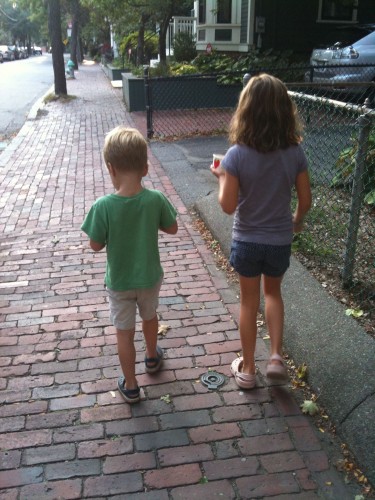I wanted her to see that the only life worth living is a life full of love; that loss is always part of the equation; that love and loss conjoined are the best opportunity we get to live fully, to be our strongest, our most compassionate, our most graceful selves.
-Pam Houston

I was thinking this weekend of the universality of sadness, of the inescapable fact that the sunshine of every life is mottled with shadow. I think the thing that varies is our sensitivity to the shadow. Some of us are just feel more keenly the loss that is always part of the deal. Some of us are more prone to shadow than sun. Some of us have a narrow but deep moat of loneliness around our hearts which is uncrossable by anyone else.
I love Pam Houston’s confident assertion that this awareness of loss lends itself to strength, compassion, and grace. I spend a lot of time worrying about what I have bequeathed to my children, through example and heredity. Pam Houston’s words offer a stunning change of perspective and I can imagine – momentarily – that this inheritance is a gift and not a burden. What if, as Adrienne Rich said, “her wounds came from the same source as her power”? What if what seems like great weakness is the source of great strength?
I fret about the message I’m sending my children by not hiding from them my occasional sweeping sorrow. Sure, there are days I act happy when I feel blue. And of course there are genuinely joyful days, many, many of them. But there are also days where my eyes unexpectedly fill with tears and when they ask why I explain, quietly, that the world is making me sad. I just re-read my words about a particularly sad weekend Grace had last winter and cried, again, struck by the fact that already, at seven, she has the self-awareness to say “I’m just sad, Mum.” Actually it’s more than the awareness that strikes me: she has the propensity to be just sad in the first place, and this is clearly part of the legacy I leave her. I often feel soggy with guilt about it.
Grace and Whit both witness and inherit my melancholy leanings, though so far Grace exhibits them much more frequently. I have decided, personally, that to teach them to honor and accept all of their feelings, even the difficult ones, is more important than to put on a happy face all the time. Of course, I am not sure I’d actually be able to fake it, so it might be convenient to call this a “decision.” But I do believe that helping my children to recognize their strong emotions, even sadness and anger, is an important thing for me to do. I also think there is great power in learning that one can be thoroughly tossed around in emotional whitewater and still come out the other side, spluttering, maybe, with sand in your pants, but still, standing.
In fact the words I wrote in July (in my musing on whitewater) seem to echo Pam Houston’s gorgeous lines (though less elegantly):
I know the terms I want to live my life by start with compassion and empathy and kindness, and that they include a deep need to honor the reality, savage and beautiful as it is, of my life.
It makes me sigh with comfort to weave together my own definition of what matters most and Pam Houston’s belief that awareness of loss can contribute to a fully-lived life. It only comes in passing, this profoundly reassuring sense that my sensitivity, which marks how I approach everything, could be, in fact, my road home. But in those moments I feel grateful and calm: maybe Grace and Whit can take what they learn from me and use it to be strong, and compassionate, and full of grace.
I do want my children to learn that the best lives are full of love, and that loss is part of the deal – I believe both of those things as firmly as I believe anything. If I can do anything to help Grace and Whit believe this, through my example, my genetic material, or my direct teaching, then I will have done some good in the world. Of that I am sure.
Originally written in October 2010

I, too, struggle with seeing my eldest (10) son grapple with a melancholic personality. I do see the gifts it brings, such as compassion and empathy and it makes me proud, but then I see how he seems inherently sad….like me, and I feel for him. Oh, life!
Great post. When I read these types of posts, I can SO relate. We are similar in this way.